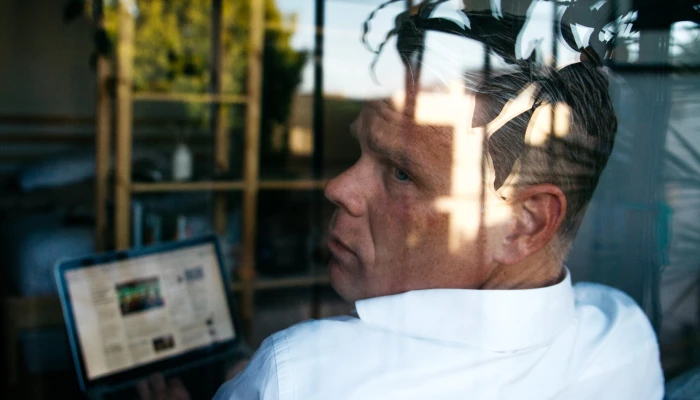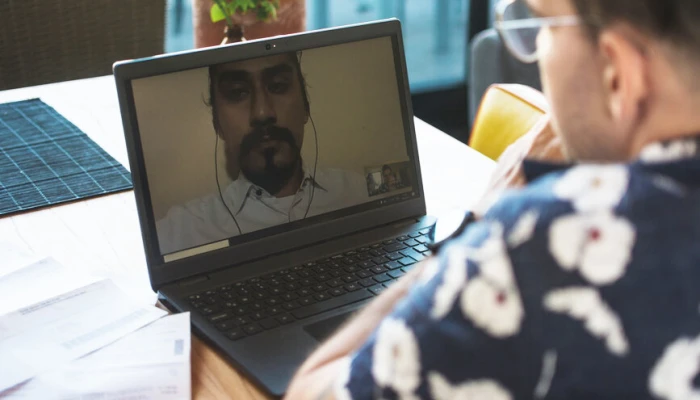R U OK at work: supporting others bereaved by suicide
In this 3-part interview series, I speak to En Masse Head of Psychology Dr Andrew Stock about the various types of recommended interventions at work in relation to supporting a team member with a mental health issue, with special consideration of some of the current challenges of the pandemic and working from home.
Third in the series is our 11-minute chat about how to support others in the aftermath of having lost someone they know to suicide, including some insight into the experience of grief and the range of emotional and other natural responses connected to this, which can be helpful to understand when offering support.
A transcript is available further below.
This recording contains subject matter, including references to specific examples of behaviour, to which you might relate, or that may trigger distress or discomfort.
If you do experience this normal reaction, we encourage you to speak to:
- your Employee Assistance Program, if one's available at your workplace
- Lifeline (in Australia) on 13 11 14
- Suicide Call Back Service (in Australia) on 1300 659 467
- in less urgent situations, your GP or other qualified health professional.
In situations where you or someone you know is in imminent danger, contact:
- emergency services (in Australia) on 000 (triple zero).
There’s something about the human experience that means that this is something that occurs for a lot of people. Does that mean we throw up our hands in the air and say “it’s just going to happen”? No we don’t. We do everything we can to support people and try to prevent suicide from happening.
— Dr Andrew Stock
Transcript
HK: Hello and welcome everyone to this third part of our three-podcast series on mental health, and I am here today with our Head of Psychology at En Masse, Dr Andrew Stock. Hello Andrew and welcome.
AS: Hi Helena. It’s good to be here talking about a difficult topic but an important one nevertheless.
HK: Absolutely. So today we are going to talk about what do you do when someone has had someone, a friend or family member, who has taken their life by suicide? How does it impact someone? So Andrew maybe that is the first question – when a loved one or a friend has ended their life how does it impact the people who they are close to in terms of grief? What are the sorts of things that those people might experience?
AS: Well in some ways Helena it mirrors a lot of grief when someone dies for other reasons. There’s the shock of the loss and a lot of sadness, almost a difficulty accepting what has happened. I think with a lot of cases when it’s death by suicide there is an added layer of it feeling quite unfair. There’s almost this sense of really trying to figure out, well, “why?” Also often “what could I have done differently?”, “what did I miss?”
There’s a lot of times where people might wonder or look for reasons and that can sometimes lead to people turning a little bit on themselves and thinking “how could I have done anything differently?” So a lot of the grief work around suicide and the people who are impacted by that is about really helping them to have a healthy dose of self-compassion in that moment because it is just such a hard time.
Some other difficult feelings that might show up alongside the typical ones of sadness might also be almost a sense of anger, I think, and that’s a tricky one for people because they feel like “I’m not allowed to be upset with this person for ending their life by suicide”.
HK: “I should be sad.”
AS: Yes, “I should be sad, I shouldn’t be angry”. But the whole thing with feelings is that feelings arise. It’s not our job to necessarily police them; it’s our job to recognise them and when we’re trying to work it through ourselves, or with someone that we know who’s experienced it, it’s about really validating that it’s okay for those feelings to arise and maybe even it’s understandable. This person meant a lot to you and they decided that they were finding life so tough that they couldn’t go on and the hardest thing about suicide is that it not only impacts the person who has died but obviously very much impacts the person, the people, around them that really cared for them.
HK: Yes very much so, and does it differ? Do those emotions differ when someone has lost their life or by suicide relative to if it’s been due to a chronic illness? You’ve spoken a little bit about people thinking “what could I have done differently?”, “should I have noticed the signs?” Are there other ways that this grief differs when someone’s ended their life by suicide?
AS: I think the specific thing that’s coming to my mind Helena is people feel like it shouldn’t have happened. Perhaps that occurs with other types of death and loss as well. This particular type, I think, is one of the most poignant sort of reactions around grief and loss because to be honest it’s kind of true. Obviously suicide is preventable, and so that’s what we spent the first two podcasts talking about – recognising the signs and trying to support people who are perhaps having some suicidal ideation. It’s preventable and yet we’re not going to stop all suicides tomorrow. I think the World Health Organisation reports about 800,000 a year across the planet.
HK: Oh wow that’s a significant number isn’t it?
AS: It’s a huge number. So there’s something about the human experience that means that this is something that occurs for a lot of people. Does that mean we throw up our hands in the air and say “it’s just going to happen”? No we don’t. We do everything we can to support people and try to prevent suicide from happening.
When it does happen and when a person makes a decision, an important part is to be able to recognise the limits of what we can control and influence when it comes to other people’s lives.
HK: Yes, and when someone has died by suicide, and family and friends are grieving for them, how can we support those people? What are some of the helpful things that we can do?
AS: Good question Helena. I already mentioned sort of the validating of their feelings. I think if we build upon that basic sense of validation, and trying to stay out of judgment of how anyone quote-unquote should ‘respond’ or ‘react’, just coming alongside that person and being with them in that moment, I think you mentioned in an earlier podcast, sometimes that looks like sitting in silence with the person, sometimes that looks like bringing a meal over for someone who’s grieving and having a difficult time, sometimes that means joining them in their grief and their sadness because it’s that sense of solidarity and togetherness that actually helps people through this.
What can make it far worse is when people feel as though they’re not allowed to have those emotions. They don’t want to burden others, and that can be a real issue. I know that Helena from a professional point of view, I also know it from a personal point of view, having quite a long time ago now having lost a family member to suicide, and sometimes feeling like: “I’m not sure if it’s even okay to talk about this because it is such a difficult thing and a sad thing to talk about. Do I really want to upset the people that I’m talking about [this] with?”
What I’ve begun to learn is that it’s so important that we do recognise that suicide happens and that one part of preventing it is being willing to talk about the fact that for so many of us it is a lived experience and that we all navigate that experience slightly differently, but that we can all also certainly benefit from getting the support along the way.
HK: Thank you Andrew and thank you for sharing your personal story as well. What I’m hearing is we don’t always have to have something rote-learnable to say. Just being with that person, taking over a meal for them, even saying “hey would you like to come over for a cup of tea” or maybe it’s a walking meeting with a coffee given we are in lockdown at the moment. So now we can still connect with people but we probably just need to think a little bit more creatively about how we do that, but just being there and saying “I’m here” even if I guess you walk in silence with that person while you have your coffee – just to be with them and not feel like we have to have all the right (what we think might be the right) words to say all the time. Because I think that’s what a lot of people feel like “what do I say? what don’t I say?” and that can be a barrier to connecting and showing that support and compassion for that person.
AS: Well we also know from the research Helena, and I’m thinking of Professor Diego De Leo who is one of the world leaders in understanding the research around suicide, and Professor Diego who has experienced a lot of personal tragedy in his own life and dealt with some level of suicidal ideation, mentioned that when he was experiencing that height of emotional pain, having that support network meant that he could again find purpose and meaning in his life in the aftermath. It’s not about finding that right away, it’s about having the support you need to work through the pain and the grief that’s inevitably going to arise. So you can arrive [at] and rediscover those things that you care most deeply about even in the face of those difficulties and I think about just that example you gave really visualising that walking with someone with a coffee in silence just together, that sense of solidarity, I think that really brings home the point of really just being there for each other through these difficult times.
HK: Great, thanks Andrew. A really challenging topic to talk about but some really practical, great suggestions in there for us, and I think one of the other key messages that came through very strongly for me was that given time we will get back to a sense of normality and enjoy our life, so there was that sense of optimism that came through at the end. So thank you very much again Andrew, really important podcast series, really important topic. Thank you very much for your practical advice. As always, a real pleasure talking with you Andrew and hopefully we can talk again in the not too distant future.
AK: I look forward to it. Thanks for having me Helena.


